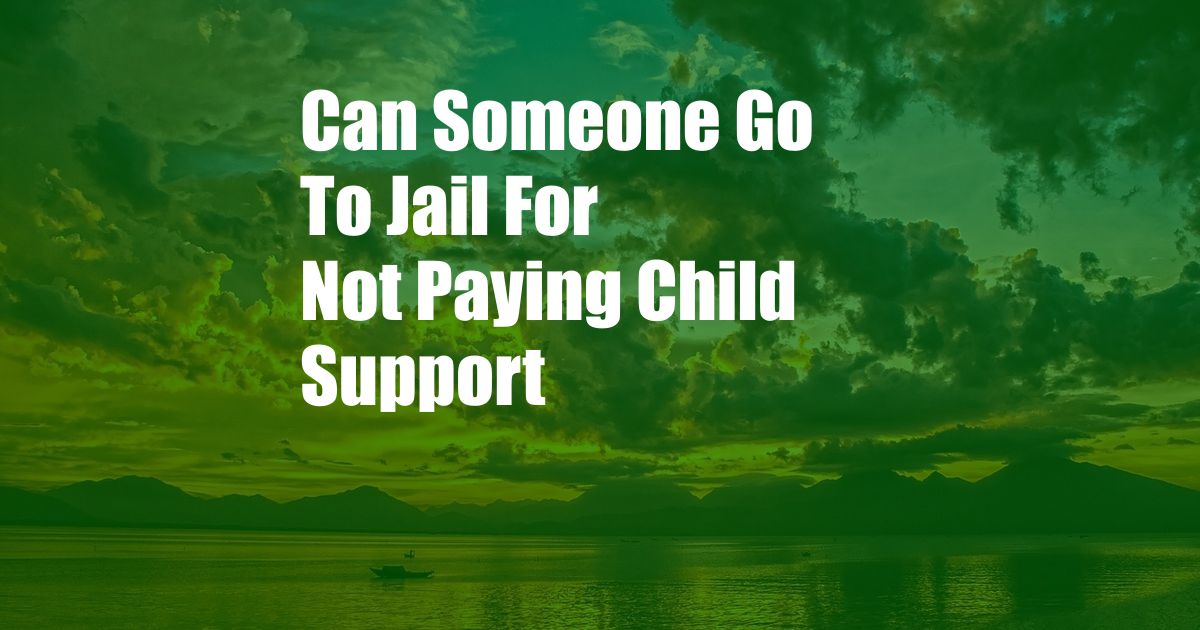
Can Someone Go to Jail for Not Paying Child Support?
While neglecting to pay child support is a serious offense, it does not typically lead to imprisonment in the United States. The primary focus of the legal system is to compel parents to meet their financial obligations towards their children. However, in certain exceptional circumstances, individuals who repeatedly and willfully refuse to pay child support may face criminal charges.
This blog post will delve into the complexities of the legal consequences surrounding unpaid child support, providing a comprehensive understanding of the topic. We will explore the legal framework, penalties, and potential exceptions that govern this sensitive issue.
Legal Framework of Child Support
Child support is a court-ordered payment made by the non-custodial parent to the custodial parent for the financial upkeep of their child. The amount of child support is determined based on various factors, including the income of both parents, the number of children, and any special needs of the child.
The legal obligation to pay child support stems from the fundamental principle that both parents are responsible for the welfare of their children. Failure to fulfill this obligation can result in legal consequences, ranging from civil penalties to criminal charges.
Penalties for Non-Payment of Child Support
In most cases, non-payment of child support is treated as a civil matter. The custodial parent can initiate legal proceedings to enforce the payment order, which may include wage garnishment, liens on property, or suspension of professional licenses.
However, in egregious cases, such as when the non-custodial parent willfully and repeatedly refuses to pay child support, criminal charges may be pursued. This is especially true when the non-payment affects the well-being of the child and demonstrates a clear disregard for the court order.
Exceptions to Criminal Charges
While criminal charges for non-payment of child support are rare, there are some exceptions where they may be appropriate.
- Persistent and Willful Non-Payment: If the non-custodial parent has a history of deliberately avoiding payment obligations, they may be criminally charged.
- Concealment of Income or Assets: When the non-custodial parent intentionally hides their income or assets to evade child support payments, they may face criminal prosecution.
- Endangerment of the Child: In severe cases where the child’s well-being is jeopardized due to the lack of financial support, the non-custodial parent may be charged with child endangerment.
Tips and Expert Advice
To avoid potential legal complications, it is crucial for non-custodial parents to prioritize their child support obligations. Here are some tips and expert advice:
- Communicate with the Custodial Parent: Open and honest communication can help resolve any issues related to child support payments.
- Keep Accurate Records: Maintain detailed records of all child support payments made, including dates, amounts, and payment methods.
- Seek Legal Advice if Necessary: If there are difficulties in fulfilling child support obligations, consult with an attorney for guidance.
FAQs about Non-Payment of Child Support
Q: Can I go to jail for not paying child support the first time?
A: In general, no. Criminal charges are typically reserved for repeated and willful non-payment that harms the child’s well-being.
Q: What are the consequences of not paying child support?
A: Consequences may include wage garnishment, liens on property, suspension of driver’s licenses, and potential criminal charges.
Q: What should I do if I am unable to pay child support?
A: Contact the custodial parent to discuss payment arrangements, seek legal advice, and explore government assistance programs that may provide financial support.
Conclusion
Non-payment of child support is a serious matter that can have severe consequences for both the non-custodial parent and the child. While imprisonment for non-payment is rare, it can occur in cases of extreme and persistent neglect. Non-custodial parents should always prioritize their child support obligations and seek professional guidance if they encounter difficulties in fulfilling them.
Are you interested in learning more about the legal implications of child support?